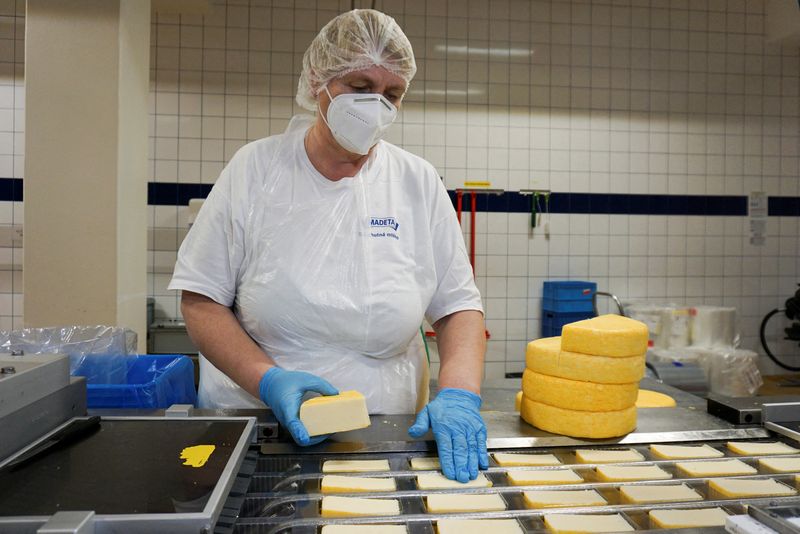By Jason Hovet and Krisztina Than
PRAGUE/BUDAPEST (Reuters) - Czech foundry Benes a Lat has seen its energy bill double in the past year and its finance director is racing to get client contracts rewritten so it can pass on some of the burden.
The family firm's challenge is mirrored in thousands of companies across central Europe, big and small, which are grappling with soaring costs for everything from parts, materials and transport to energy and growing wage demands.
"We are an energy-consuming (firm), so it's had a huge impact," Benes a Lat's Chief Financial Officer Jan Lat said.
"We are in negotiation with customers to get indexing (with energy prices) back into contracts to follow market prices. Clearly every buyer's first reaction is: It's your problem!"
Where companies are successful in sharing the pain, this feeds into consumer inflation and adds to a price spike in central Europe that has been stronger than elsewhere on the continent due to the region's consumer-driven recoveries and ultra-tight labour markets.
The extent to which companies are able to lift prices at the beginning of 2022 can help determine where inflation will peak and how much further the region's central banks need to tighten policy, analysts say. There is a growing risk that inflation will be stronger than some expect.
"Companies are trying to shift higher costs at least partially to customers, which will feed into inflation," said Michal Brozka, a Komercni Banka economist in Prague.
Central European firms ended 2021 on a bullish note with business sentiment surveys improving, while consumer demand has stayed solid.
The region is facing the same inflationary pressures as others, but is also battling strong wage growth with unemployment rates among the lowest in the EU.
The Czech National Bank signalled this month inflation will be higher than previously expected, likely rising above 9% at the beginning of 2022 with a chance of going past 10%.
Policymakers have already raised interest rates significantly, unlike the European Central Bank which has sought to look past the price spike in the adjacent euro zone.
COSTS SURGING
Led by energy prices, soaring costs are being felt by goods producers across central Europe.
A survey by the Hungarian GKI Institute in December showed small- and medium-sized businesses expect on average a 15% rise in costs in 2022, partly due to a 20% hike in the minimum wage by the government before an April 3 election.
A Czech Industry Confederation survey found one in five firms expected to raise prices by at least 10%, and 38% will raise prices by 5-10%.
Czech dairy group Madeta raised prices on its products by 10% or more this month.
"We are trying to pass higher costs for energy, packaging materials and other inputs as much as we can into output prices. Unfortunately there is no other way," Madeta director Milan Teply said.
In Hungary, carmaker Suzuki is also passing some of its higher costs onto customers. "We are doing our best to optimize our costs but we will be forced to build a part of this rise into prices," the company told Reuters.
LOOKING FOR THE PEAK
Capital Economics said last week that inflation is likely to remain high or fall back toward targets more slowly than expected in the Czech Republic, Hungary and Poland.
Hungarian rate setters meet on Tuesday, and analysts expect the base rate to rise another 30 basis points to a nearly eight-year high of 2.7% to tackle inflation at a 14-year peak of 7.4%.
Analysts in a Reuters poll forecast average inflation this year climbing to 5.5%, the highest since 2012 and a full 65 basis points above forecasts from a month earlier.
The National Bank of Poland, battling inflation that is already at a more than two-decade high of 8.6%, has lifted its main rate by 215 basis points to 2.25% since October.
Grzegorz Maliszewski, chief economist at Bank Millennium in Warsaw, said companies can continue passing on higher input prices while consumer demand stays strong.
He added Poland's main interest rate could climb to 4% this year.
In the Czech Republic, producer prices grew last year at their fastest pace since 1995.
Markets are betting the country's central bank will hike its main rate, now at 3.75%, by another 50 basis points in February, following 300 basis points of rises between September and December. Some analysts think the rate could peak this year close to 5%.
"...input cost increases are so broad... the pass-through to consumer prices is inevitable," said Jakub Seidler, chief economist with the Czech Banking Association.
"(The pass-through) will be much higher than we have seen in previous years."
